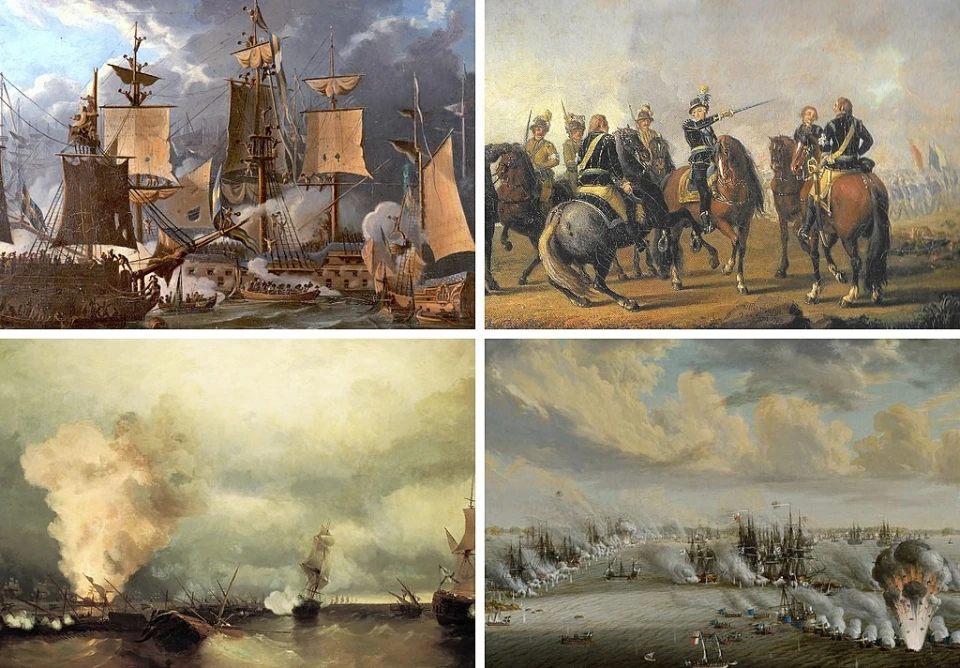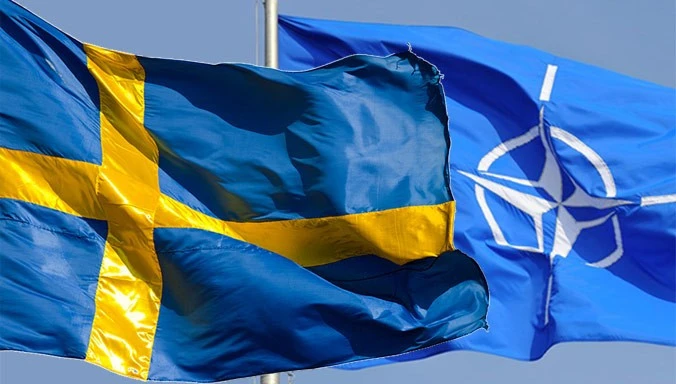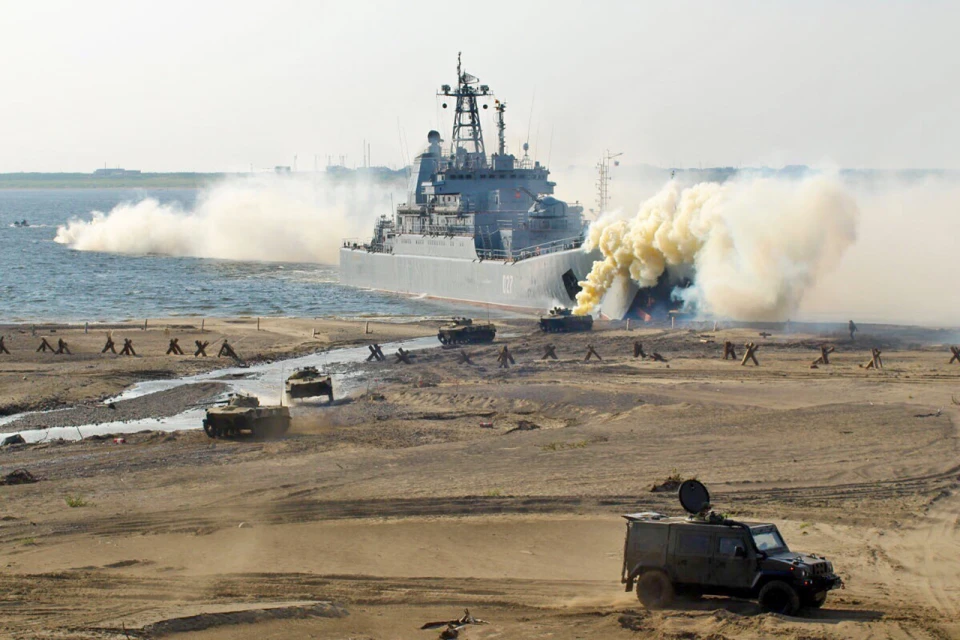
Battle for Gotland: How Sweden is preparing for potential war with Russia
Sweden is increasingly concerned about Russia's statements that it is ready to go to war with NATO's Arctic members to “protect its interests.” Therefore, Swedish officials “do not rule out an attack by Russia” on their territory and are increasing military spending, in particular, by strengthening the defense of the island of Gotland. However, can it really come to that?
The last time the Swedes fought the Russians was 200 years ago, when they lost Finland from their zone of influence, which became an autonomous part of the Russian Empire. Now, with the threat of a full-scale Russian war in Ukraine looming, Sweden and Finland have urgently joined NATO, committing to Article 5 of the collective security treaty, which states that an attack on one member is an attack on all. With St. Petersburg and the territorially isolated Kaliningrad region, in their view, encircled by NATO, the Russians are seeking ways to strengthen their position in the Baltic Sea.
Espreso examines the history of conflicts between Sweden and Russia and whether another war could be expected in the current climate.
Russian-Swedish wars: historical context

Photo: Russian-Swedish war in the late eighteenth century - Wikipedia
Throughout its history, Russia has consistently waged wars against all its neighbors, so it's not surprising that history records 11 major Russian-Swedish wars.
These conflicts, which spanned from the 15th to the early 19th century, involved the Kingdom of Sweden and the Grand Duchy of Moscow (later the Russian Empire). Most of these wars were about the struggle for influence in the Baltic Sea region, control over key ports and territories around the Gulf of Finland, territorial dominance, and geopolitical interests.
Starting from the 17th century, Sweden had significant influence over the Baltic Sea, which was crucial for its international trade. Russia also sought to expand its maritime ports and gain direct access to the Baltic Sea, which became one of the key reasons for the conflicts. Many wars also focused on territories that are now part of modern Finland, Estonia, Latvia, and parts of Karelia, which both nations aimed to control. Thus, the Kingdom of Sweden in the 17th century was one of the most powerful military forces in Europe, and Russia sought to challenge this status to establish itself as a strong international player.
The first in this series of long wars can be considered the conflict from 1495 to 1497, marking the first major war between the Grand Duchy of Moscow and the Kingdom of Sweden. The main cause was the struggle for control over the coast of the Gulf of Finland. This was followed by the prolonged Livonian War (1558–1583), a conflict for influence in Livonia (present-day Estonia and Latvia) involving several European powers, including the Tsardom of Moscow and Sweden. During the Ingrian War (1610–1617) over control of Ingria (the area around modern St. Petersburg), the Muscovites lost their access to the Baltic Sea, and it took them a hundred years to regain it.
This was facilitated by Tsar Peter I, who rebranded his country as the Russian Empire and managed to tilt the scales in his favor during the prolonged Great Northern War (1700–1721). For Ukrainians, this war is primarily known for the Battle of Poltava in 1709, when the troops of Swedish King Charles XII, supported by the Cossacks of Hetman Ivan Mazepa, attempted to defeat Peter I's soldiers. However, the plan failed. Thanks to his victories, Peter I "opened a window to Europe" for Russia, regaining access to the Baltic Sea and establishing control over the Baltic states.
Since then, the Russian Empire became the dominant power in Northern Europe for a long time. However, wars did not cease, as the Russians set their sights on Finland, which was part of Sweden. In the mid-18th century, Russia again defeated Sweden, strengthening its control over Finland. The Swedes did not give up, and at the end of the 18th century, King Gustav III attempted to regain the territories lost in previous conflicts. Despite Swedish efforts, the war ended without significant changes to the territorial distribution.
The last major war between Sweden and Russia occurred from 1808 to 1809 and is known as the Finnish War. Initially, the Russians were close to defeat, but ultimately they defeated the Swedish army in Finland. As a result, the Swedes had to cede all of Finland, which became part of the Russian Empire. From that point on, the Swedes abandoned their imperialist ambitions and retreated into the background in the Baltic region.
200 years of Swedish neutrality and accession to NATO

Photo: eurointegration.com
For nearly two centuries, Sweden was known for its policy of armed neutrality, which it adopted after its defeat by Russia and the end of the Napoleonic Wars. The last war in which Sweden participated directly was the war of 1815, resulting in Norway being forced into a union (Norway only became independent in the early 20th century). Since then, the country has decided to avoid involvement in international military conflicts, focusing its resources on internal development and diplomacy.
Interestingly, despite its neutrality, Sweden actively maintained a high level of defense readiness, developing a modern army and navy to prevent potential invasions. Thus, the Swedish military has always been a priority.
As a relatively small European country in terms of population, Sweden recognized after the devastating wars of the 17th, 18th, and 19th centuries that neutrality was the best way to preserve its sovereignty and national security. Therefore, the Swedes aimed to avoid involvement in major conflicts that could threaten their economic and political stability.
This policy led Sweden to avoid alliances that could involve it in wars. For example, during both World Wars, it remained neutral, although it interacted with both the anti-Hitler coalition and Nazi Germany to protect its economy and population.
However, after the end of the Cold War, the world became less predictable, and many nuances emerged. Threats from terrorism, regional conflicts, and aggressive actions by Russia compelled Sweden to reassess its neutral policy. This became particularly relevant after Russia's annexation of Crimea in 2014 and the beginning of the war in Donbas.
At that point, Swedish politicians and society began to doubt whether military neutrality alone was sufficient to protect against potential threats. Moreover, Sweden has been a member of the European Union since 1995, which also led to a shift in its foreign policy. Collective European security became an important component of Sweden's strategy, prompting integration with NATO forces long before its official membership.
Thus, the growing threats and the need for collective security led the Swedish government, which had long upheld neutrality, to gradually change its position on joining the Alliance. The situation dramatically shifted in 2022 following Russia's full-scale invasion of Ukraine. Sweden and Finland simultaneously announced their intentions to join NATO, marking a historic shift in their foreign policy. Notably, it was important for the Swedes that they took this step alongside Finland, as both countries face the same adversary, and it is easier to defend together than alone.
Finland officially joined NATO on April 4, 2023, effectively doubling the land border between NATO countries and Russia. After some resistance from Turkey, Sweden became the 32nd member of the Alliance on March 7, 2024.
The Russian threat: Moscow's goals and how is Gotland involved
The rising tensions between Russia and Sweden are primarily linked to the geostrategic importance of the Baltic region. After Sweden's accession to NATO in 2024, Moscow views this region as a potential conflict zone. Historically, the Russians have sought to control the Baltic Sea for centuries, as it is crucial for their trade, military security, and energy routes.
Naturally, Sweden, along with other Baltic countries and NATO members, is concerned about a possible Russian invasion due to its aggressive actions, particularly following the annexation of Crimea and the full-scale invasion of Ukraine.
“We have always been very suspicious of Russian aggression. Obviously things have changed dramatically since the full-scale invasion of Ukraine. We say now that we should have realized [the extent of Russia’s threat] in 2008, [when Russia destabilized] Georgia, and then in 2014, when the first [Russian] aggression against Ukraine took place. In 2022, it became totally self-evident. Now, Russia is the defining threat that we build all of our defense capabilities to be able to meet,” Swedish Prime Minister Ulf Kristersson said in June 2024.
Swedish Defense Minister Pål Jonson was even clearer. He recently stated that the direct threat of an attack from Russia remains more than real.
"Russia poses a threat to Sweden, just like to the other NATO countries. We cannot rule out a Russian attack on our nation. We are increasing investments in defense, which have doubled over the past four years. This is absolutely necessary, considering decades of underinvestment in the armed forces. However, I want to emphasize that there is no other country with a population of 10 million, like Sweden, that can independently build fighter jets and submarines," said Pål Jonson, who previously noted that Swedish citizens must be prepared for war.
Sweden's leadership has also repeatedly stated that Sweden's largest island, Gotland, could become a point of conflict. After all, control over it would allow Russia to dominate the Baltic Sea, which would have catastrophic consequences for the region.
At the beginning of the year, the Chief of Joint Operations of the Swedish Armed Forces, Lieutenant General Carl-Johan Edström, emphasized the importance of Gotland for NATO's collective defense and discussed current plans to strengthen the island's air defense as part of NATO's defense operations. In March 2024, the Prime Minister of Sweden stated that strengthening Gotland was one of the first issues to be discussed with NATO allies, highlighting Sweden's readiness to further reinforce the island. The Prime Minister also acknowledged the current vulnerable state of the island regarding its defense capabilities.
Gotland has an area of 3,100 km², with a length of 170 km between its furthest points. The shores are rocky, making it a natural fortress in the middle of the Baltic Sea. Since the late 17th century, Gotland has been under the Swedish crown almost continuously, except for a few years in the early 19th century when it was captured by the Russians.
During the Cold War, Gotland was considered a bastion in the Baltic Sea, housing a significant number of Swedish troops. However, in the early 1990s, following the collapse of the USSR, the island was demilitarized until 2005. This undoubtedly drew the attention of the Kremlin, which has always sought out weaknesses in its adversaries. Following the onset of Russian aggression in Ukraine, Swedish troops returned to the island in 2016, including infantry with tanks and surface-to-air missiles.
The proximity of Gotland to the Russian exclave of Kaliningrad, where Russia has a significant military arsenal, as well as to the Baltic countries - Latvia, Lithuania, and Estonia- makes it strategically valuable for protecting NATO's eastern flank in the event of a military conflict between Russia and the Alliance. Kaliningrad is home not only to a significant portion of Russia's Baltic Fleet but also to its nuclear arsenal. In response to the re-establishment of Swedish military presence on the island since 2016, Russia is also reinforcing its military position in the region, continually adding artillery, multiple launch rocket systems, and missiles capable of reaching Gotland.
Analysts assert that if Russia were to capture Gotland in the event of a war, the Kremlin would effectively cut off NATO's access to the Baltic states. The Swedish government believes that the Russians are particularly interested in deploying their air defense systems on the island. Therefore, following the onset of Russian aggression in Ukraine, NATO forces have repeatedly conducted exercises where Gotland played a central role.
As former U.S. Army Europe commander Ben Hodges explained back in 2017, there is no island more valuable to the Alliance than Gotland. Currently, Gotland is a primary focus for the Swedish government, which is investing heavily to strengthen its defense capabilities by developing a training ground and additional military port. Additional NATO troops are also being deployed to the island, as it is no secret that Gotland would be the first target in a hypothetical war between Russia and Sweden.
Could Russia attack Sweden?

Photo: defence-ua.com
Sweden considers Russia's current actions unpredictable, so it is preparing for any possible scenario. The island of Gotland is central to all these calculations.
“I'm sure that Putin even has both eyes on Gotland. Putin's goal is to gain control of the Baltic Sea. If Russia takes control and seals off the Baltic Sea, it would have an enormous impact on our lives — in Sweden and all other countries bordering the Baltic Sea. We can’t allow that. The Baltic Sea must not become Putin's playground where he terrifies NATO members,” Sweden’s defense chief Micael Bydén said in May.
These words were spoken in response to the Russian Ministry of Defense's plan to change and expand Russia's territorial waters in the Baltic Sea. Although the Russians later contradicted themselves by claiming they would not violate international law to adjust their borders in the Baltic, the reliability of their statements is questionable.
Moreover, the Russian Ministry of Defense and the higher political leadership have repeatedly accused NATO, and now Sweden, of threatening regional stability, emphasizing that the deployment of additional military forces on Gotland could lead to "serious escalation." Russian officials constantly assert that any attempts to expand NATO's military presence in the region are viewed as a "direct threat to Russia's security."
And in September, Russian Foreign Minister Sergei Lavrov said that Russia is “fully prepared to defend its interests in the Arctic region in the event of a conflict with NATO” in the military, political and technological spheres.
Experts predict a possible further increase in Russian military presence in the Kaliningrad region, located near Gotland. However, would Putin dare to initiate a direct war with NATO? If it were 2014, such a reality might have been plausible, as Gotland was demilitarized and Sweden was outside NATO. Now, this is not an easy task for the Russian army, especially given that they are bogged down in a large-scale war theater in Ukraine.
On the other hand, war is often assessed in terms of losses and gains. Control over the Baltic Sea is a desired goal for Putin's regime, which sees fabricated threats everywhere and is therefore reviving its imperial policies over spheres of influence. Additionally, it is crucial for Russians that their shadow fleet, which circumvents Western sanctions, has more room to maneuver. If Russia were to seize Gotland, it would significantly simplify its military and trade operations in the Baltic Sea. However, Sweden's and NATO's swift actions are making the ambitions of the Russian regime increasingly unrealistic by the day.
Thus, Moscow is engaging in what it knows best - continuing provocations and demonstrating strength. In response, NATO is strengthening its presence in the Baltics, while the Swedish armed forces are restoring the defense of Gotland, hindering potential Russian plans to expand its spheres of influence. In this way, Russia's ambitions are met with a resolute response from Western countries, something that has been lacking, unfortunately, in the case of Ukraine.
- News











































